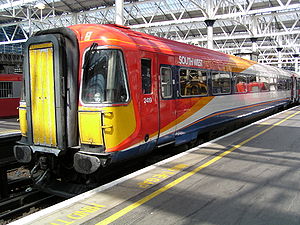British Rail Class 442
Appearance
| <British Rail Class 442 Wessex Electric | |
|---|---|
 442419 "BBC South Today" at London Waterloo on 19 July 2003. This train is painted in South West Trains Express livery | |
| Number built | 24 trainsets |
| Number in service | 8/17 trainsets |
| Specifications | |
| Car length | DTS - 23.15 m (75 ft 11.4 in) TSO/TSW/MLC - 23 m (75 ft) |
| Braking system(s) | Disc |


The British Rail Class 442 Wessex Electric (or 5WES) electrical multiple units, were introduced in 1988 on the South Western Main Line from London Waterloo to Southampton Central, Bournemouth, Poole and Weymouth. Twenty-four of these 5-car units were built between 1988 and 1989 by BREL at their Derby works. Their introduction coincided with the completion of electrification from Bournemouth to Weymouth. The entire fleet was operated by South West Trains up until February 2007, when the Class 442 services were replaced.
